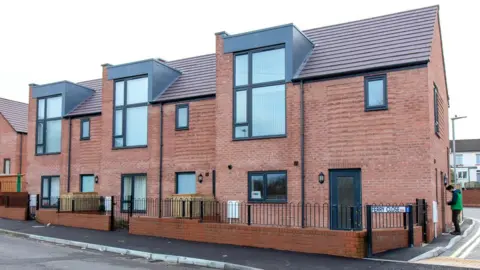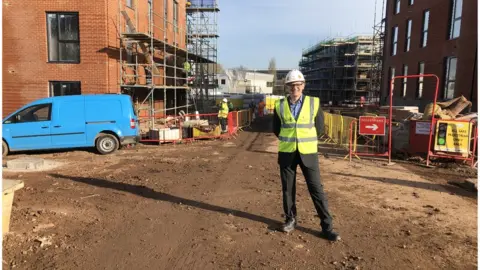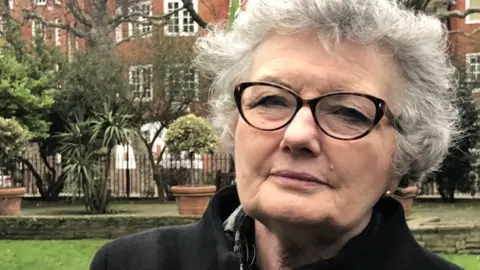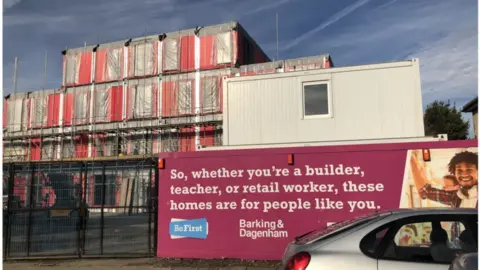Building surge hints at comeback of the council house
 Bristol City Council
Bristol City CouncilEnglish councils are building homes again, on a scale not seen in decades, constructing an estimated 13,000 dwellings over a 12 month period. That's tiny compared with housing need, however many councils have plans to expand, so could this be a sign of the return of the council house?
Right To Buy, one of Margaret Thatcher's most popular policies, gave hundreds of thousands of families the chance to own their council home and transformed their financial status, but it resulted in local authorities losing an estimated two million dwellings. Long-term tenants can still buy their homes at a discount, and councils only get to keep a third of the proceeds.
In 2017-18 there were nearly half a million vulnerable households on waiting lists for social housing.
A short stroll from the river Avon in Bristol, overlooking a children's playground, there is a cluster of new brick-built homes. With double-height windows on the upper floors, they look like an upmarket private development. But they're the latest addition to Bristol council's housing stock.
"It's a dream house," one tenant said. The single mother, who only moved in two months ago had been living with her baby in a one-bedroom flat in a tower block. Now she has two bedrooms, two bathrooms, and a garden. Her baby has his own room, and loves playing in the garden too. She said: "He's so much happier here."
But in her view, more houses are urgently needed.
There's an acute housing shortage in Bristol, with 13,000 families on the council's waiting list. Within three years the local authority aims to be the biggest developer in the city. The council has completed 200 homes and has plans for a further 900.
"We haven't built like this since the 70s," said Councillor Paul Smith, Cabinet Member for Housing.

However, not all the homes will be socially rented council housing. Aston Rise, the biggest development so far, 80 of the 130 homes will be sold to private buyers in order to fund the project.
Some of the council houses in the heart of the estate have views of the Clifton Suspension Bridge, and could be attractive for a long-term tenant to buy.
In the past, Mr Smith has been highly critical of Right to Buy but he said the council had no choice but to keep building. "We've seen already how our new housing has transformed people's lives, the lives of their children."

Last year, Professor Janice Morphet of the Bartlett School of Planning at University College London asked all councils in England about their housing plans. She concluded they had built or acquired more than 13,000 homes over a period of 12 months.
These are a mixture of different tenures - some traditional social rented housing, others for sale or at a higher rent. Most of these do not appear on official government statistics. "That's partly because councils are just getting going," she said - and partly because of the different routes they use.
According to her research, both Conservative and Labour councils are building. Nearly 80% of them have set up companies to do this. If they build houses through these companies, rather than using their own Housing Revenue Account, they are not eligible for Right to Buy.
'Two new Becontrees'
Becontree was once described as the biggest council estate in Europe, the size of a small town, with 100,000 people. Now 80% of the houses have been sold through Right to Buy and the local authority, Barking and Dagenham, has what local politicians see as a housing crisis.
The council has one of the most ambitious building programmes through its company Be First.
Council leader Darren Rodwell said he hoped to see the equivalent of "two new Becontrees" over the next 20 years. But they will not be traditional council estates: there will be a mix of tenures, in different locations. Some new rented homes will come from deals with private landlords who "build to rent".

Mr Rodwell is confident these new dwellings will not be eligible for Right To Buy, despite the council's role. "You use the protection of the private sector to deliver what I see as the goals of a 21st Century community," he said.
However, government policy is to encourage home ownership. It supports Right to Buy, the Help to Buy policy which assists first time buyers to purchase new homes, and is now consulting on a new "First Homes" policy.
This would offer a further discount to home buyers, and be paid for through contributions that housing developers already make through the planning system: currently this often pays for social or affordable homes.
Some MPs are critical of the councils' approach.
The Conservative Bob Blackman said more social housing was urgently needed, and it was good that councils were building again. But he said he thought it was "fundamentally wrong" they were using their own companies to prevent them being sold to tenants. He has asked the government to investigate.
Mr Blackman said it was good that more social housing was being built: he thought authorities should keep more of the proceeds from sales, and use that to build more, "so that we have a virtuous circle".
"We continue to provide new social housing in this country and as people improve their circumstances, they have the right to own that property and more people can move into the property that's been developed."
The Ministry for Housing said it was "important that social housing tenants have the opportunity to become home-owners" and, while housing companies can be an effective way to deliver new homes, "we would expect them to offer an opportunity for tenants to become homeowners".


To get plenty more facts on the housing system and how it affects you, download the full BBC Briefing on housing here. At the end, there's a glossary of useful terminology to help guide you through the debate.
Part of a mini-series of downloadable guides to the big issues in the news, it has input from academics, researchers and journalists and is the BBC's response to demands for better explanation of the facts behind the headlines.

